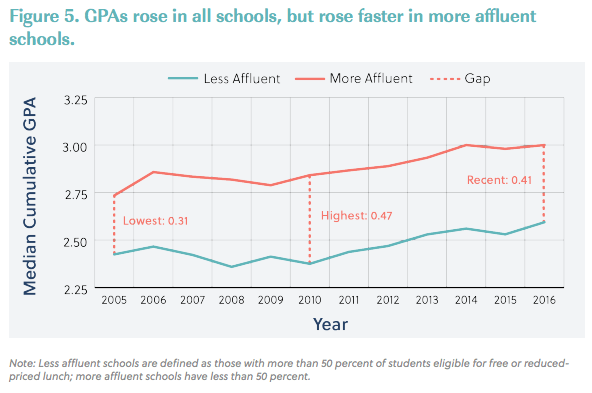You Earned a Ticket!
Which school do you want to support?

Students and parents look to teachers for feedback. Teachers report progress, or the lack of it, through red marks, letter grades, report cards and parent-teacher conferences.
In This Lesson
Should my child repeat a grade?
What is differentiated instruction?
What does tracking mean in schools?
Are graduation rates rising or falling?
What are high-stakes tests?
Do the SAT and ACT tests cost money?
How are Advanced Placement (AP) tests used?
★ Discussion Guide
In other words, we depend on schools to tell us whether our kids are on track and learning what they need to know to succeed in life. Should parents believe what they hear? That's where standardized tests come in.
Academic and educational milestones
In elementary and middle school, a few academic milestones matter a lot:
- By the end of 1st grade, kids need to know the alphabet, the numbers, and some basic classroom norms.
- By 3rd grade, read becomes essential, because schoolwork shifts from "learning to read" to "reading to learn."
- Similarly, by about 4th grade math advances beyond basic numeracy, becoming a way to solve problems and answer questions.
When students don't achieve these educational milestones on schedule, what should happen? Should they advance to the next grade anyway (an approach known as social promotion) or is it better to repeat a grade? Each California school district is required to have a written policy on pupil promotion and retention (PPR). There are no easy answers, but the general guidance of the National Association of School Psychologists is to take a "promotion plus" approach. That is, move the student to the next grade level and invest in providing the student with the specific support they need to get on track.
Tracking and differentiation
Students of the same age don't necessarily have the same academic skills. In order to challenge students at an appropriate level, teachers try to create ways of differentiating instruction within the same classroom. If the differences are too great, a teacher might create groups, spending extra time with the students that need extra help.
As students advance, they tend to separate. By middle school, some students are well prepared for algebra and Shakespeare, while others need more basic support. The differing sets of courses that students take, particularly in English and mathematics, are sometimes formalized as tracks. These tracks can become destiny. Once a student is enrolled in a course on a less-rigorous track, it is extremely difficult to jump to a higher one.
Girls rule the schools, academically
Girls are more likely than boys to graduate from high school.
Over the long term, America's students have been graduating from high school at a rising rate. This is good news, though tempered by big gaps. White and Asian students are far more likely to graduate than Black and Latino students. There's a gender gap, too — girls generally outperform boys in overall academic outcomes. They are more than ten percentage points more likely to graduate than boys.
Graduation is important, but not all courses are of equal rigor, and the meaning of a grade can vary a lot. In 2018 the Alliance for Excellent Education examined long-term data to look for evidence of the stability of meaning of a letter grade in high school courses. They found that grade inflation is not just real, but unequal. According to study author Seth Gershenson, grade inflation has had an unequal pattern: "it’s gotten easier to get a good grade in more affluent schools, but not in less affluent ones." This kind of unequal grading is less important than it might seem when it comes to college admissions because colleges tend to evaluate the meaning of grades in the context of the school.

In the pandemic, grade inflation spiked; educators were reluctant to punish students with tough grades. For some colleges, standardized test scores helped fill in the blanks. Others reportedly relied even more than usual on class GPA rank, a common practice to compare academic achievement and rigor among candidates from a school.
In order for high school students in California to qualify for admission to the state's four-year public universities, they must satisfactorily complete a set of courses known as the a-g requirements, as discussed in Lesson 6.2. More good news: students have been taking and passing these courses at rising rates.
High-stakes tests
Annual standardized tests such as California's CAASPP are sometimes mistakenly called high-stakes tests. Actually, while these tests are important to school leaders, students actually have little stake in them. The truly high-stakes tests for students are the ones that determine whether and where they might be able to go to college.
The ACT / SAT. In high school, most students with their sights set on college take either the ACT test or the SAT test. For many years, these tests have been critically important for admission to selective colleges in the U.S. and required as a part of the application process. During the Pandemic, this requirement was interrupted. Many selective colleges suspended this requirement or made the tests optional. This included all of California's public colleges (UC and CSU).
In ordinary times, colleges use the scores on these standardized tests as a vital sorting tool, for good reasons. Imagine yourself as an admissions officer facing piles of transcripts from thousands of students. Some high schools are more rigorous than others, so it can be difficult for admissions officers to evaluate the true value of a student's grades. The ACT and SAT exams, by contrast, are the same for everyone. Students score differenty on the tests based on their readiness to take them. Admissions officers are aware, of course, that students' scores reflect a combination of factors, including the learning they do in school and the learning they do through test-prep programs and tutoring, which cost money. They admit students based on their prediction of whether students will thrive in college and add to the student body, using whatever information is available to them.
Is it possible for colleges to choose which students to admit without using standardized tests? Of course. Are admission decisions better or fairer without this information? It's hard to make that argument. People love to hate the standardized tests, and there is enormous pressure for colleges to get rid of them, or ignore them. Colleges care a lot about their reputation, yet they have repeatedly declined to do so because the tests have a history of helping them make admissions decisions that they believe are better, and less apt to be "gamed". In large high schools, admissions officers may have enough information to evaluate the rigor of coursework and make good predictions about which students will succeed in college. In rural, small, or virtual schools this information is unavailable.
Both the SAT and ACT charge a fee, but both the College Board and ACT waive the fee for students in poverty, with proper documentation.
AP Tests. Advanced Placement tests are exams offered on a variety of subjects. Scores on these tests build a college applicant’s resume. The Advanced Placement program, run by The College Board, offers college-level curriculum and examinations to high school students. Schools submit their curricula and apply to get AP designation for their courses. The program includes standardized end-of-course exams. Some American colleges grant course credit to students who score high enough on AP tests, or use the information to make course placement decisions.
Mastery-based education
In most of the classes they take, students are graded. Students who really understand the course material and do well in the class earn an A. Students who struggle might squeak by with a D. At the end of the term, all of the students advance to the next class.
Sal Khan, the founder of Khan Academy, argues that this is a fundamentally broken approach to learning. If students don't know the material, he argues, it's a demoralizing waste of time to pretend otherwise. He argues that the right approach to education is to focus on mastery for each student in each core subject, rather than just moving on. (Watch Sal's presentation at the 2020 conference for the Ed100 Academy for Student Leaders. He's very passionate about this issue.)
Some school communities have folded this approach to education into an even bigger framework often called a Graduate Profile. This approach evaluates students' progress toward mastery of competencies that extend beyond academic readiness to include character skills and readiness for civic life.
Updated 2017
March 2018
March 2019
October 2021
CHAPTER 9:
Success
-
Success
Overview of Chapter 9 -
Measures of Success
For Kids and For Schools -
Student Success
How Well is My Kid Doing? -
Tests
Standardized Measures of Student Learning -
Student Readiness
College and Career -
Education Data
Keeping Track of the School System -
Achievement Gaps
The System's Biggest Challenge -
The Dashboard
Measuring California School Performance -
After High School
What California’s System Provides -
Paying for College
High hopes and college loans
Related
- There are no related lessons.
Sharing is caring!
Password Reset
Search all lesson and blog content here.
Login with Email
We will send your Login Link to your email
address. Click on the link and you will be
logged into Ed100. No more passwords to
remember!















Questions & Comments
To comment or reply, please sign in .
Jenny Greene August 12, 2020 at 7:05 am
Jamie Kiffel-Alcheh December 4, 2019 at 9:26 pm
So I needed to learn how to take the SAT. That cost money and time. What a waste of resources.
I graduated from Wellesley magna cum laude. The SAT didn’t measure my ability or my intelligence, only my aptitude at taking the SAT.
Caryn-C September 13, 2017 at 8:55 am
AP tests are a whole other can of worms. I think there is tremendous variability in the quality of AP classes. I've seen some that are brutal, homework-intensive burdens and others that are incredibly taught by teachers passionate about their subjects. Personally, I don't think that any course offered a ninth grader (AP Human Geography is offered here in 9th) should qualify for college credit. But, no one is asking me!
And no matter how many times I read about how university admissions depts. want your well-rounded learner, if they don't have a strong standardized test score, buena suerte.
Carol Kocivar March 7, 2017 at 8:25 am
Carol Kocivar October 27, 2016 at 2:32 pm
The national average is 83.2 percent. Read this article from EdSource for more detail: https://edsource.org/2016/california-high-school-graduation-rates-close-in-on-national-average/570730
Veli Waller April 18, 2015 at 8:29 pm
mvpollack66 September 7, 2015 at 10:04 pm
Susannah Baxendale March 18, 2019 at 3:26 pm